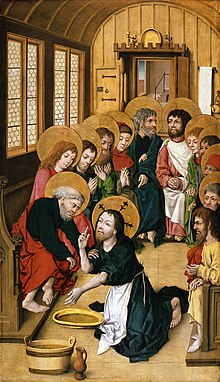Sacramental

Sacramentals (Sing. The sacramental ) are holy signs according to the Catholic understanding, which in a certain imitation of the sacraments denote spiritual effects and are obtained through the intercession of the Church (cf. can. 1166 CIC ). They wrap themselves around the sacraments like a wreath and extend them into the everyday life of Christians. Unlike the sacraments, however, they do not work out of themselves. Its effect is based on the consecration prayer of the church and the faith and trust of the individual Christian, the donor and recipient.
Sacramentals are essential features of the church and an expression of its basic sacramental structure. The blessings are praises to God for his works and gifts. The Church encourages the faithful to appreciate and use the sacramentals, since they are an activity in the sense of the royal-priestly vocation of every Christian to shape daily life out of faith and in unity with the Church and of the gifts of God Exercising the Spirit of the Gospel.
Types of sacramentals
There are different types of sacramentals. Above all, they include ordinations and blessings, exorcisms , processions , worship celebrations and rituals . They include the consecration or blessing of persons ( virgin consecration , religious professorship , benediction of an abbot or an abbess ) as well as of objects ( altar consecration , consecration of a chalice ) and places ( church consecration , cemetery blessing ). The child blessings and meals are examples of family sacramentals. The blessing of the palm branches on Palm Sunday , the donation of the ash cross , the washing of feet on Maundy Thursday , the veneration of the cross on Good Friday , the holy water , the commemoration of baptism and the church funeral are also sacramentals.
Some ordinations have lasting effects when individuals are consecrated to Christ and to the service of the Church, or places and objects for liturgical use. These ordinations are given once and for all and are never repeated. What has once been consecrated or blessed for worship through consecration or blessing must not be misused ( CIC , can 1171). However, it can lose its consecration or blessing again ( profanation ), be it through destruction or through a decree of the competent church authority.
The benediction defines whether a sacramental can only be donated by clerics or those of a certain degree of ordination ( bishop , priest , deacon ) or also by lay people . The more a blessing is related to the church as such and to its sacramental center, the more it is assigned to the bearers of an ordination office in the church. For example, the blessings of public institutions are performed by a minister who represents the Church in this area. Therefore, blessings are reserved for the bishop in which a special relationship with the diocese becomes evident ; Priests, deacons or appointed laypeople bless in the life of the parish or in local public life; Parents bless in the family.
Orthodox churches
In the Orthodox Churches and in Orthodoxy, sacramentals are known as Artoklasia (breaking bread) and the great consecration of water on the day of Jesus' baptism .
Individual evidence
- ↑ Lexicon for Theology and Church 3 (1999), Volume 8, p. 1455.
- ↑ Pastoral Introduction to Benediction, No. 18.
literature
- Catechism of the Catholic Church. Munich u. a. 1993, No. 1667-1679, pp. 446-449.
- Romano Guardini : Of sacred signs. Mainz (1927) 1960.
- Leonardo Boff : Little Sacraments. Düsseldorf 1976.